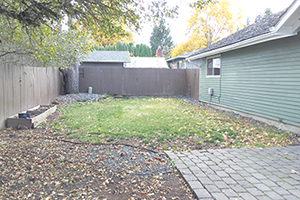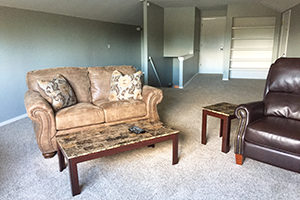By PATRICIA CORRIGAN
A woman with a gambling addiction left her home in a small community on the Oregon coast to flee from an unhealthy relationship and put space between her and a casino she frequented there. About a year ago, she moved some 60 miles inland to Eugene, where she would add homelessness to her burdens.

Phoenix Program teaches formerly homeless individuals skills necessary to secure and keep permanent housing. This photo shows a house in Eugene, Ore., used as transitional housing for program participants.
But her luck was about to change. She got treatment for her compulsive gambling at an addiction treatment center, and additional behavioral health counseling from ShelterCare, a private, nonprofit human services agency. ShelterCare had an opening in its Phoenix Program, a newly established transitional housing program. During her five months as a Phoenix Program client, she regained her footing. Carrie, who was identified by ShelterCare by her first name only, moved into her own apartment in September.
PeaceHealth of Vancouver, Wash., partnered with Kaiser Permanente Northwest late last year to get the Phoenix Program up and running. The health care companies jointly provided a $590,000 grant — $390,000 for the startup and $200,000 for the second year.
ShelterCare administers the grant as part of its portfolio of housing and support services for the homeless and near homeless.
Tim Cling, ShelterCare's senior director of operations, said that in February the agency leased two houses in Eugene as Phoenix Program residences and set aside several efficiency apartments in a converted Eugene motel it also uses for housing and its offices. The houses are about 5 miles apart. Men live in a four-bedroom home; women in another four-bedroom home with a one-bedroom carriage house. Residents have private bedrooms, sharing the kitchens and bathrooms in the fully furnished homes.
To date, the program has provided 23 people with transitional housing. Residents can stay up to six months. During that time, they are accumulating skills they'll need to make a successful transition to permanent housing. ShelterCare's support team helps with that.
The team includes a case manager, who takes into account the clients' goals when developing a plan for services; a housing specialist, who helps clients look for permanent housing and assists with applications for housing aid and leases; a community health worker, who accommodates health care access; and a skills trainer, who offers instruction in practical tasks such as searching job sites online or finding furniture when a move is imminent.

Jordan
The Phoenix Program gets client referrals from other ShelterCare programs, from PeaceHealth, from medical respite programs and from behavioral health and mental health service providers. "When we intake each client, we write a personalized service plan. We are getting people housing-ready," said Cara Ashworth, Phoenix Program manager. "We do expect them to engage in case management services, and they can opt to continue these services for up to six months after they move into permanent housing."
Individuals referred from a program that provides services for people with severe mental illness who are frequent users of emergency room services or the criminal justice system, and clients who are medically frail or chronically mentally ill may require extra help from the skills trainer with physical or organizational tasks, she said.
The Phoenix Program caseworkers also can help participants access mental health and medical services, as the program does not provide those services directly, said Ashworth.
Goals en route to independence
The Phoenix Program provides a safe place to regain stability, said Jennifer Jordan, senior consultant for Community Health and Government Relations at Kaiser Permanente Northwest. Clients "can take care of their basic needs and they are able to meet with community health workers to prioritize other needs, such as getting on a waiting list for permanent housing, getting a driver's license or tending to their physical or mental health care."

Kingston
"The program is making an impact," said Mary Kingston, chief executive of the PeaceHealth Oregon Network. "We are meeting our goal to help ensure a transition to stable, permanent homes." To date, 10 of the 23 clients have moved into permanent housing.
Better together
Kingston emphasizes the practical benefits of tackling homelessness with community partners: "When it comes to projects that help the most vulnerable, we must be in partnership with our community, because this is not easy work. But with open minds and hearts, it is the new order of things."
In Kaiser Permanente, a health care provider and insurer that entered Oregon in 2015, PeaceHealth has found an eager partner. "We believe in working with local partners, organizations that have community support, a track record and expertise," Jordan said. "We have a deep relationship with PeaceHealth and also with ShelterCare, which has a stellar reputation."
Furthering their partnership, Kaiser and PeaceHealth expect to announce grants late this year or early next that will advance community health initiatives including expanding access to dental care for low-income individuals and building a workforce of community health workers.
Housing as health care
Access to safe, affordable housing is one of the core social determinants of health that have a great impact on a person's well-being, health status and life span. Homelessness has risen in tandem with housing prices in Lane County, where Eugene is located. In its January point-in-time count of sheltered and unsheltered homeless, Lane County reported more than 1,600 homeless people, a 7 percent increase from 2017.
"When you don't have a home, many things about your life are unstable, including your food supply, having a place to clean up to go to a job and also your ability to make phone contact for follow-up medical care," Kingston said. "So many things start to unravel when you don't have a home."

Phoenix Program teaches formerly homeless individuals skills necessary to secure and keep permanent housing. This photo shows a house in Eugene, Ore., used as transitional housing for program participants.
A communal seating area in a Eugene, Ore., home leased by ShelterCare to house participants in its Phoenix Program. PeaceHealth and Kaiser Permanente Northwest partnered in the grant that funds the transitional housing program for the homeless.
Transitional housing programs with wraparound social services prepare people with long years living on the streets to move to stable housing. Ban said the federal government no longer funds transitional housing for the homeless.
"That's why the Phoenix project is a game changer," Ban said. "It's the missing link, the bridge that provides safety and shelter while individuals look for permanent housing.
"This is an exciting time in our community, with health care coming to be part of the solution to homelessness," Ban said. "The Phoenix Program has created a new hope."
PeaceHealth and Kaiser Permanente Northwest both are reviewing the outcomes from the initial grant, and both organizations are considering new funding for the program. Jordan said, "We know housing is health care — and we know we can make a bigger impact for the homeless together than alone."
Copyright © 2018 by the Catholic Health Association
of the United States
For reprint permission, contact Betty Crosby or call (314) 253-3490.